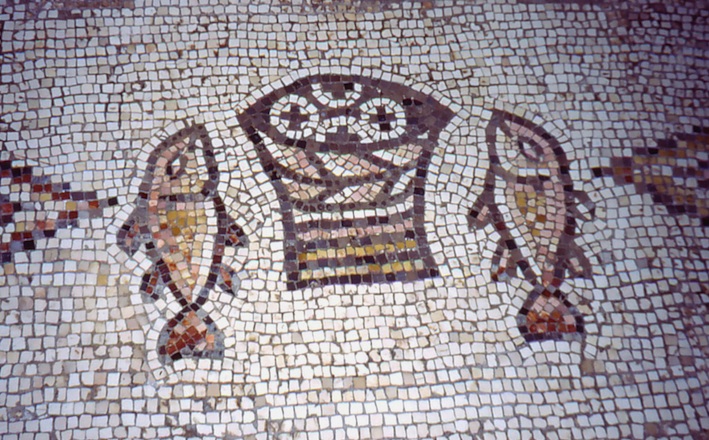Commentary on Matthew 14:13-21
On a recent field trip with my daughter’s class to a nature center, the class was taught about metamorphosis.1
There are two types of metamorphosis that animals can undergo: (1) complete metamorphosis (for instance, a caterpillar goes through four distinct phases in order to become a butterfly); and (2) incomplete metamorphosis. An example of incomplete metamorphosis is a chicken. A chicken goes from an egg to a chick to a chicken. Essentially once the egg hatches, the chicken simply grows from a smaller version of itself to a much larger form of itself. Both forms of transformation can be witnessed in the Gospel of Matthew.
The role of Jesus as a teacher in Matthew 13 shifts to Jesus’ role as a miracle worker. As described earlier in the gospel, “Jesus went throughout Galilee, teaching in their synagogues and proclaiming the good news of the kingdom and curing every disease and every sickness among the people” (Matthew 4:23). As a result of Jesus’ ministry, large crowds follow him. In 14:13, Jesus once again leaves the crowd and takes refuge in a boat and once again the crowds follow him (see 13:1-2). One of Jesus’ most recognized miracles is found in this text, but it occurs only after he spends time healing the sick people.
After seeing the crowd, Jesus felt compassion for them. We often emphasize the miracle, but overlook the sympathy that literally moves Jesus. Jesus’ compassion compels him to act. So, too, should it be with us. While we may feel sympathy for someone, how often does the emotion result in action? Jesus cures the sick people in the crowd because he cared for them. Apparently Jesus’ healing had taken a great deal of time because his disciples come to him and suggest that he send the crowd away.
The disciples’ request is not malicious. They simply are aware of their location (a deserted place) and the time (the day has turned into evening). Jesus says to the disciples, “They need not go away; you give them something to eat. They replied, ‘We have nothing here but five loaves and two fish’” (Matthew 13:16). Although the disciples approach is understandable—it’s getting late and people are probably starting to get hungry—Jesus seems perplexed by the disciples’ request to send the people away. Why would they leave when the disciples had food?
The miracle of Jesus feeding more than five thousand men, women, and children is a widely studied miracle. Some scholars focus on the blessing of the loaves and bread and suggest that this miracle is perhaps the precursor of the communion meal. Others focus on the satiated crowd or the symbolism of the twelve full baskets. While all of these observations are notable, the simple detail that Jesus did not send the people away is also remarkable. Instead of commanding them to leave, he orders them to stay and sit down on the grass. He then gets to work doing what he has come to do—curing every disease and sickness among the people. The multiplication of the loaves of bread and the fish harken to the previous parable that Jesus speaks to the crowd concerning the mustard seed. The kingdom of heaven produces a plentiful harvest from the smallest of seeds.
This miracle demonstrates that Jesus attends to the physical needs of the people. He does not focus solely on their spiritual health through his teaching. He is also concerned that they are sick. He empathizes with those who are hungry. Are Christians today as concerned about the physical health of God’s people as Jesus is or do we focus only on our spiritual health? Like the disciples, do we naively send people away when we think our resources are too limited to have an impact?
Perhaps there is much to be gleaned from this ancient example to address two major issues in our society today—healthcare and hunger. The debate in the United States concerning the healthcare system is based on the principle of whether one views it as a right or a privilege. The healthcare system is the way that we care for our sick today. Are the appropriate resources allocated to this care? Does it meet the needs of most, if not all, of our citizens? Are we more concerned with political party affiliations or seeing the sick healed? Jesus, moved by compassion, healed the sick and we should do likewise. Today, we can advocate for a system that is more akin to the kingdom of heaven and less like the ancient Roman imperial system that God’s kingdom opposed.
There is still a need to feed the hungry in our world today. According to The World Food Program, approximately “795 million people in the world do not have enough food to lead a healthy active life. That is about one in nine people on earth.”2 Hunger is related to illnesses and developmental disabilities. It is difficult, if not impossible, for a hungry child to focus in school. What are we as Christians doing to feed the hungry? Many churches have kitchens that supply food and provide meals to those in need. How can and do we contribute to these efforts? Your offering can be the “little” resources (like that of the disciples) that when blessed and added with others can bring forth an increase. Planting gardens, giving of our excess, and advocating for and supporting programs that feed the hungry are all ways that we, too, can bring forth God’s kingdom on the earth.
After teaching the crowds and instructing his disciples about the kingdom of heaven in chapter 13, Jesus makes the kingdom of heaven real through his acts of healing and performing miracles in this text. In the kingdom of heaven, there is compassion, people share their resources, and there is more than enough for everyone. At this point in the gospel, perhaps the disciples had only gone through an incomplete metamorphosis. Although they had grown and were maturing in their faith, they had not been completely changed. Experiencing a complete metamorphosis means going through the four stages of development and being totally transformed into a new creation. When this total transformation occurs, we, like Jesus, can be moved by compassion and attend to both the spiritual and physical needs of God’s people.
Notes
- Commentary first published on this site on Aug. 6, 2017.
- See https://www.wfp.org/stories/10-facts-about-hunger. Accessed June 15, 2017.


August 2, 2020